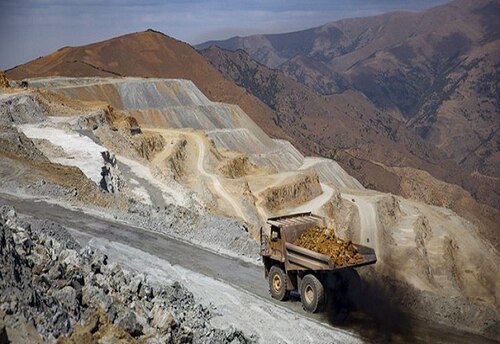While following the news in the East part of Kurdistan, I came across news, both happy and painful. Another news from the identification of new mineral areas in Sna (Sanandaj) province. It is pleasant in that this is a sign of the richness of Kurdistan's territory and painful in that it is all being plundered by the occupiers, just as the natural resources of the East part of Kurdistan have been plundered by the occupying governments of Tehran over the years. Such news abounds in the Occupied East, but this one has always interested me.
The headline read: "Identification of 27 new gold and iron ore mineral areas in Sna province."
Bakhtiar Khaliqi, head of the Iranian government's Industry, Minerals, and Commerce department in Sna province, told government websites in the province, "According to the new discoveries, there are seven gold and iron ore areas in Saqqez, six areas in Bijar, and fourteen gold and iron ore areas have been identified in Qurwa.”

In this regard, I must say that the provinces of the East part of Kurdistan, especially Sna province, are very rich in natural resources such as gold and other precious stones. During the rule of the Islamic Republic of Iran, these resources of Kurdistan have always been in the control of the authorities and the Revolutionary Guards and have been looted. Kurdistan has gained nothing from this wealth and has always lagged behind Iran's central provinces in terms of services.
In the report, the head of the Iranian government's Industry, Minerals, and Commerce department in Sna province said that 4,139 people are employed in the mining units of Sna province.
I must point out that government agencies and even the Iranian Statistical Center never publish accurate statistics in various fields and always publish false and misleading statistics to mislead public opinion. It is the same in this regard. On the other hand, in the active mines of the East part of Kurdistan, less local force is used and most of the force is brought to Kurdistan from the surrounding cities, especially the central cities. However, this has always been the policy of the regime that the unemployment rate in the Kurdistan provinces is high and the Kurdish nation is always subject to the regime and turns to Kolbari for their livelihood. Let it remain that Kolbari is neither a job nor a profession and is only for the further oppression of the Kurdish nation.
For instance, according to Bakhtiar Khaliqi, there are 194 active and 158 inactive minerals in Sna province and four minerals are under preparation. In total, the mineral reserves of Sna province are 600 million tons. If the people of this province work in these minerals, no one will turn to Kolbari anymore and the unemployment and poverty rates will decrease. On the other hand, if a large part of the revenue from these minerals is spent in Kurdistan, Kurdistan will certainly develop in many areas, but it is clear that the government has never had such an intention. Its only job is to plunder and destroy the environment and nature of Kurdistan.

According to government statistics, 12,700 square kilometers of territory in Sna province is under mineral and geological exploration. In other words, the government wants to discover Kurdistan's undiscovered natural resources and plunder them like other minerals. Meanwhile, Kurdistan and its people's share is only unemployment, Kolbari, poverty, and environmental destruction.
Another aspect of this issue that is very important and must be addressed is the destruction and damage to the Kurdistan environment by the companies that are engaged in the exploration, extraction, and looting of minerals in Kurdistan. For example, Diwandara, Saral, and Chlchama regions in Sna province are some of the largest meat producers in Iran; In addition to meat, they also produce milk, wheat, and honey. Mineral extractors destroy animal pastures and beehives and directly affect the economy of the people and the region. Working dust in spring affects plants, trees, and wheat, destroys the natural infrastructure of the region, and becomes one of the causes of environmental and soil destruction.
Finally, I must say that more explanations must be given to the Kurdish people so that they do not remain silent against these lootings and do not allow the government to seize their land and prevent the looting of Kurdistan's minerals.









